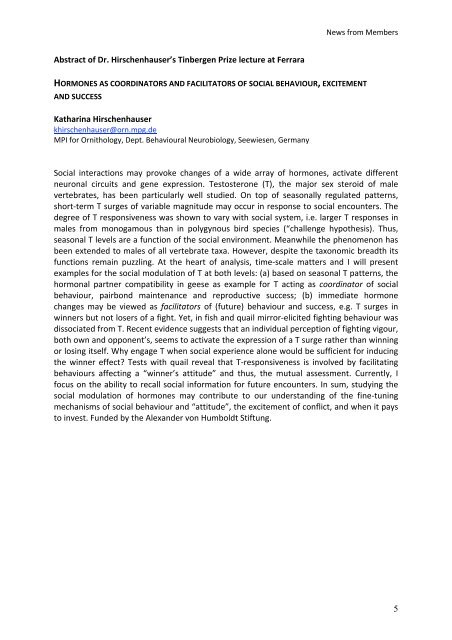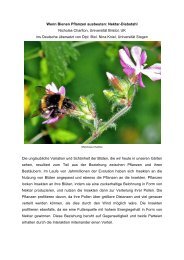PhDâ€theses - Ethologische Gesellschaft
PhDâ€theses - Ethologische Gesellschaft
PhDâ€theses - Ethologische Gesellschaft
You also want an ePaper? Increase the reach of your titles
YUMPU automatically turns print PDFs into web optimized ePapers that Google loves.
Abstract of Dr. Hirschenhauser’s Tinbergen Prize lecture at Ferrara<br />
News from Members<br />
HORMONES AS COORDINATORS AND FACILITATORS OF SOCIAL BEHAVIOUR, EXCITEMENT<br />
AND SUCCESS<br />
Katharina Hirschenhauser<br />
khirschenhauser@orn.mpg.de<br />
MPI for Ornithology, Dept. Behavioural Neurobiology, Seewiesen, Germany<br />
Social interactions may provoke changes of a wide array of hormones, activate different<br />
neuronal circuits and gene expression. Testosterone (T), the major sex steroid of male<br />
vertebrates, has been particularly well studied. On top of seasonally regulated patterns,<br />
short‐term T surges of variable magnitude may occur in response to social encounters. The<br />
degree of T responsiveness was shown to vary with social system, i.e. larger T responses in<br />
males from monogamous than in polygynous bird species (“challenge hypothesis). Thus,<br />
seasonal T levels are a function of the social environment. Meanwhile the phenomenon has<br />
been extended to males of all vertebrate taxa. However, despite the taxonomic breadth its<br />
functions remain puzzling. At the heart of analysis, time‐scale matters and I will present<br />
examples for the social modulation of T at both levels: (a) based on seasonal T patterns, the<br />
hormonal partner compatibility in geese as example for T acting as coordinator of social<br />
behaviour, pairbond maintenance and reproductive success; (b) immediate hormone<br />
changes may be viewed as facilitators of (future) behaviour and success, e.g. T surges in<br />
winners but not losers of a fight. Yet, in fish and quail mirror‐elicited fighting behaviour was<br />
dissociated from T. Recent evidence suggests that an individual perception of fighting vigour,<br />
both own and opponent’s, seems to activate the expression of a T surge rather than winning<br />
or losing itself. Why engage T when social experience alone would be sufficient for inducing<br />
the winner effect? Tests with quail reveal that T‐responsiveness is involved by facilitating<br />
behaviours affecting a “winner’s attitude” and thus, the mutual assessment. Currently, I<br />
focus on the ability to recall social information for future encounters. In sum, studying the<br />
social modulation of hormones may contribute to our understanding of the fine‐tuning<br />
mechanisms of social behaviour and “attitude”, the excitement of conflict, and when it pays<br />
to invest. Funded by the Alexander von Humboldt Stiftung.<br />
5



